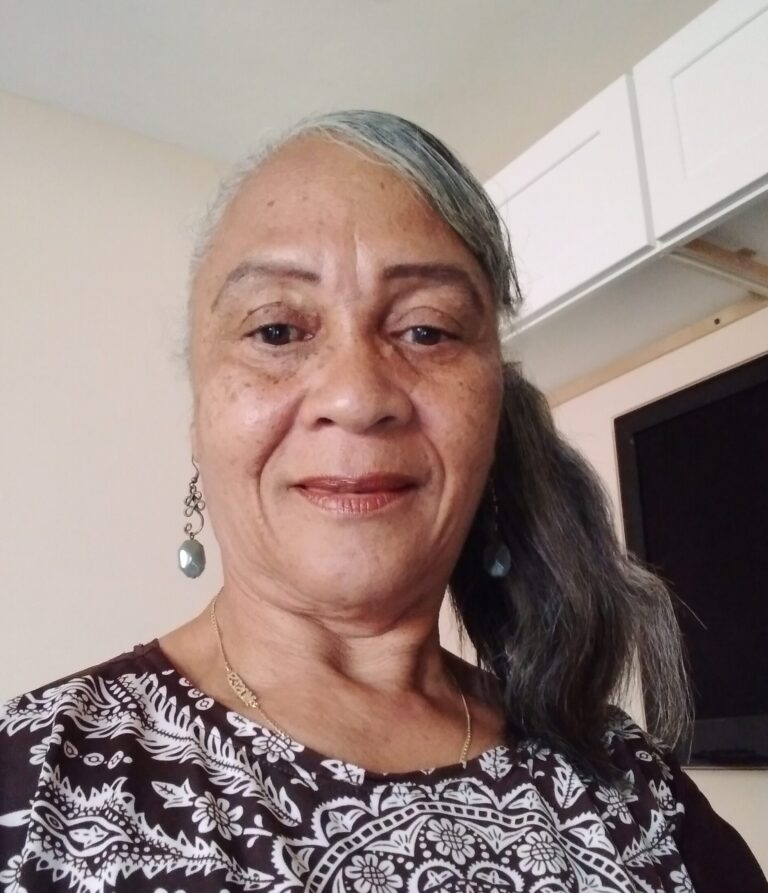Medication regime, improved diet and available support helps Betty Lambert breathe easier
by NADIA ARANDJELOVIC
Betty Lambert has always been an extremely active person. In total, she’s competed in seven Bermuda Day Half Marathon Derbys and cycled multiple times from Somerset to St. George’s in the Bermuda End to End event. It came as a huge surprise then, when she started to experience asthma symptoms for the first time as an adult – in her late 50s. “I’m an outside person and take part in as many physical activities as I can, so I never dreamt that this would happen to me,” the 63-year-old said.
When Ms Lambert started experiencing breathing problems for the first time four or five years ago, she was diagnosed with having bronchospasms – that’s the tightening of the muscles that line the airways in the lungs causing wheezing and frequent coughing. “It seemed to happen every springtime,” she explained. “I would have these bronchospasms and would need a cough suppressant, plenty of water, and rest to feel better.”
A long-time educator, Ms Lambert said before the bronchospasms began, she’d rarely if ever call in sick. But for two or three years, she noticed that every springtime there was a pattern with her having to miss work. Then in May 2020, just after the beginning of the Covid-19 pandemic, things took a turn for the worse. The coughing grew more severe this time and she was struggling much harder to breathe.
“At first I was in denial,” Ms Lambert said. “Usually when we breathe, we don’t even think about it, the breath just goes into the lungs. But this time, no matter how hard I tried, the breath just wasn’t going in. I tried to ignore it and change positions and how I was laying down, but nothing worked.”
Her normal doctor was overseas and Ms Lambert didn’t feel comfortable going to the hospital due to her fears of catching the Coronavirus. However, on that occasion, her breathing got so bad she had no other choice but to pay a visit to the emergency room at King Edward VII Memorial Hospital. After being released she found the additional medical support and interventions she was looking for. “I was in a crisis and didn’t know it,” she said. “I had promised Liz Boden (from asthma charity, Open Airways) that I’d go to the hospital to get help and I wanted to live up to my promise.”
Ms Lambert’s advice for any other adults who suddenly experience asthma symptoms is: get as much support as possible. She credits professionals like Ms Boden, Nurse Debbie Barboza, and Dr Kim Foley, a local pulmonologist, for helping her get on a medication regimen – something she’s been sticking to for over 18 months now. Without their support and them advocating on her behalf, she might not be alive today, she said. “I hope people reading my story would see there’s life after a health scare. It can get better and you can manage it.”
Betty Lambert’s tips for other adult asthma sufferers are:
Stick to your medication regime. For Ms Lambert that includes using her pump in the morning and night. She carries her medications with her everywhere she goes and credits them with why she hasn’t had any major incidents in the last year.
Take small steps to improve your overall health. Though a normally physically active person, Ms Lambert noticed in recent years her cholesterol levels had become high. “That should have been a red flag because high cholesterol can affect your heart, which can impact your lungs and breathing.” She started researching and talking to her physician about ways to reduce cholesterol and has been steadily reducing that in recent months through diet and exercise.
Eat more whole foods. Ms Lambert says that part of her asthma management plan includes eating a largely plant-based diet. She’s already lost 17lbs by cutting out red meat and hot dogs, which are high in saturated fat and sodium; as well as by reducing the amount of packaged and processed foods she consumes. Additionally, she tries to eat more fresh vegetables and chooses wholegrain breads, instead of the white alternative. “Oatmeal has become my best friend for breakfast,” she said. “Whenever I’m preparing food or grocery shopping, I have to think: is there a better choice for me? I always remember a professor saying that the heart and the lungs are married. I never paid much attention to it before, but now I try to be aware of how my heart health could be affecting my lungs.”
Lean on any support. Since being diagnosed with asthma, Ms Lambert has had a lot of support. One programme she was able to take part in is Dr. Hans Diehl’s Complete Health Improvement Programme (CHIP), which is facilitated by local health professional Nurse Beverly Howell. Designed to provide expert support and accountability for people looking to take charge of their health, the programme helped Ms Lambert ease her way back into exercising including cycling and power walking. She also keeps a journal now to chart her diet and exercise regime.

